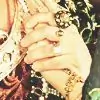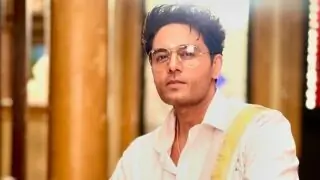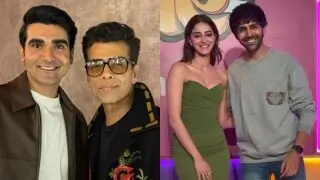Lashykanna, and Sandhya too,
As a regular reader of my Jodha Akbar posts, you would remember that the mysterious disappearance of Abdul almost immediately after Jalal burns Jodha's portrait ( I think he was there in the group around Jalal at Sambhar, on the way to the wedding, but he did not have any lines then) has been perhaps my single biggest grouse against that script, and I have reiterated that time and again. He was pure delight as long he was there. Birbal was such a poor replacement for Abdul when he turned up eventually.
I have never ceased to wonder why they cashiered Abdul in toto😡.
In case you missed it, here is my take on the Jalal-Abdul scene, perhaps their best, from my
Jodha Akbar 4: Siyaasat ki chaal
Tez dimaag aur shaatir wafadaari: This pretty much sums up Abdul, and the shaatir dimaag that never fails to light up his eyes at the oddest moments is such a delight that the fact of his subsequent and unexplained disappearance catches at my throat like a suppressed sob.
He is that rare companion who cares for Jalal for his own sake, and rates his Shahenshah's well-being and his march to a place in history far more than his own position, even in Jalal's eyes. Such courtiers are rare, and are worth their weight in gold, for they hold a pitiless mirror up to the face of their sovereign, and speak the kadwa sach to him where no one else would dare to. Much later, there is Atgah Khan, who also speaks the truth to Jalal, but far more gently and in a far more roundabout way than Abdul, even if equally effectively.
In fact, to look at Jalal and Abdul, one would have imagined that they had grown up together from boyhood. One presumes they have not, but there is a deep and genuine friendship between them regardless, a friendship that, on Jalal's side, can take the most blunt criticism without flying into a temper. Which other emperor would let a subordinate ask him : Aapne ghoda kyon de diya Shahenshah? Jahan aapko hi apni pasand ki cheeez yahan haasil nahi hoti, waisi sultanat ka kya hoga?
A void to be filled: But Jalal does, and Abdul can get away with such things because of the very strong bond of camaraderie, and trust, that they share. And this bond exists not only because Jalal understands and accepts plain speaking when he knows that it is honest and not due to some inner agenda. It exists as much because there is a void in Jalal's zehen, a void created by the absence of those who care, not for the Shahenshah, but for Jalal. And Abdul, who Jalal knows without any doubt is one such, fills this void to some extent.
So he can say bluntly: Jise ek bar Shahenshah ne chun liya, wo cheez phir kisi aur ki pasand nahin ban sakti.Kya Khan Baba to itni bhi samajh nahin jo apni hi pasand saamne rakh diya?
Dangerous arrogance: Now this is a bit unfair because there is no indication, at this point, that Bairam Khan would have insisted on having that horse in the face of Jalal's liking for it.
But the very fact that his khwaja sera has the unbelievable audacity to speak up in front of the Shahenshah, and in effect tell him that he cannot have this horse as the Wazir-e-Sultanat had already booked it, clearly demonstrates that the Shahenshah's wishes are considered, even by a lowly slave, as of little moment when they clash with those of Bairam Khan. Surely Bairam Khan must have indicated as such, at least indirectly, to his inner circle, even to this khwaja sera, otherwise the latter would never have dare to speak up in that fashion.
Later, in the cases of Zaheer and Raja Takhatmal, Bairam Khan carries this arrogance too far, and sets himself up for his eventual fall.
Do sakhaaon ka rishta: To revert, the little scene that follows Jalal's outburst against Abdul is a true gem. It is really more like play-acting between the Shahehshah and his sakhaa - that lovely term used for Lord Krishna in the Mahabharata, by, who else, his sakhi Draupadi - than like a real attempt to threaten him, not to speak of punishing him.
Even with Jalal's khanjar at his throat, Abdul's eyes are alight with an impish glee as he explains that Jalal cannot kill him: Meri to jaan hi jayegi, par aap ki shaan.. Log kya kahenge, ki Shahehshah ne ek nihatte, kamzor apahij jo maar diya?
And as he listens to him, the anger, very likely fake anger, in Jalal's eyes gives way to amusement, as a reflection of the glee in Abdul's eyes creeps into his. The way in which he puts his hand behind Abdul's head and says, every syllable drawn out in open indulgence and affection: Nihatta apahij,, haan?, is a delight to behold.
A minute later too, as Abdul, unwilling to leave without having the last word, says to the khwaja sera in open raillery: Laga do is ghode par Wazir-e- Sultanat ki mohar. There is a slight frown in Jalal's eyes. But as he goes on, Kyonki pehchan ghode se nahin, uske sawaar se hoti hai.. Jalal smiles.
NB: True enough, for Bairam Khan rides, not with Jalal's easy grace, but rather as though a sack of potatoes had been loaded on to the unfortunate horse!
Abdul continues: Aur jis ghode par mere Shahenshah sawaari karenge, wo sabse behatareen kehlayega! Baki sab.. and a throwaway gesture of contempt..
And here the warmth of Jalal's smile is a wonder to behold. For it is not that he rates his Khan Baba and his wishes any less, it is rather that he rates Abdul's unshakeable loyalty even more.
It is this that lends to Abdul's closing, sotto voce lament a special poignancy: Khwahish rakhta hoon ki kash Bairam Khan ke mansoobe aapke saamne benaqaab hon, aur aap samajh payein ki hukumat bhale hi aapki rahi hai, par iske peeche usool hamesha se hi Bairam Khan ke hi chale hain. Would that he could have been there to see, and rejoice in this manshaa of his coming true at last!
Shyamala Periyamma
Edited by sashashyam - 9 years ago




























861